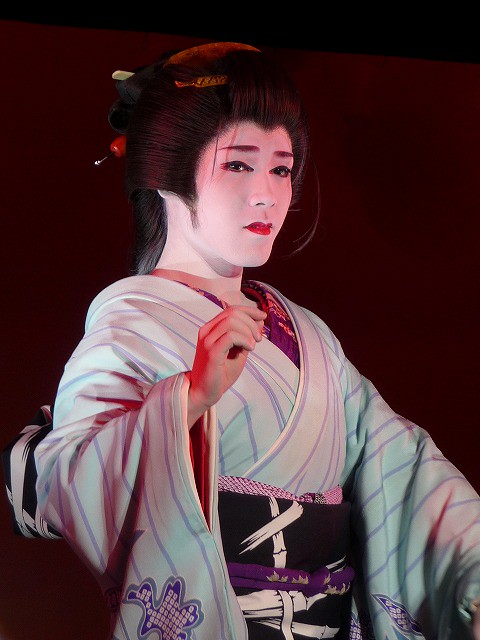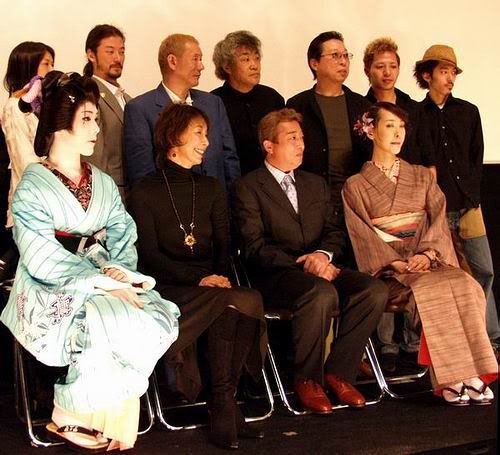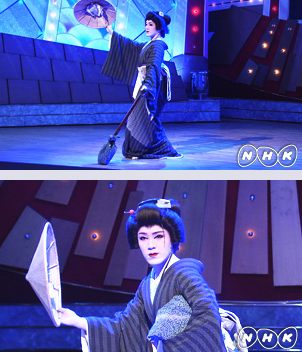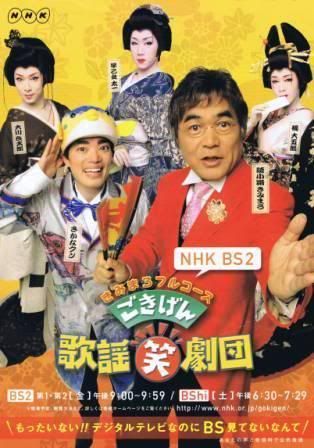Background
Taishu Engeki is a theatrical form related to Kabuki that literally means "Theatre for the Masses" or also called the "Working-Class Kabuki". Its main purpose is for entertainment of the regular people. Before, it was tradition to ban females within the theatre, thus the emergence of onnagata (an actor who specialize in female roles). Today, in Kabuki this tradition still exists, in contrast, Taishu Engeki does not necessarily follow this tradition. However, the tradition of onnagata still exists and are still widely celebrated. As traditional performers, they keep a family crest or better known as a Teimon.
 Daigoro Tachibana was born Daisuke Isayama in a family of actors in Oita Prefecture on the 27th of January in 1987. At the age of two, he was already trained to be a performer and at the tender age of three, he debuted in his uncle’s theatre, Gekidan Tachibana Kikutaro. He was taught and trained by Seizaburo Saruwaka VIII of theSaruwaka-ryuu in the art of Traditional Japanese dance and studied the choreography of Toyotaka Azuma of the Azuma-ryuu . He toured around the country for performances ever since childhood.
Daigoro Tachibana was born Daisuke Isayama in a family of actors in Oita Prefecture on the 27th of January in 1987. At the age of two, he was already trained to be a performer and at the tender age of three, he debuted in his uncle’s theatre, Gekidan Tachibana Kikutaro. He was taught and trained by Seizaburo Saruwaka VIII of theSaruwaka-ryuu in the art of Traditional Japanese dance and studied the choreography of Toyotaka Azuma of the Azuma-ryuu . He toured around the country for performances ever since childhood.At a young age, his talent and skills were recognized by many which made him earn the nickname “Taishu Engeki no kai no Purinsu” or “Taishuu Engeki's Prince” and was branded as a genius onnagata for his bewitching appearance and grace. Just in his teens, he was granted the position Waka Zacho (assistant/youth chairman), a position that names him as the heir and the next chairman of the theatre. Despite of his dream of becoming a professional baseball player, his talent and skill within the realm of traditional Japanese Theatre prevailed.
He was then a blossoming young actor and his talent and grace were recognized by an agent which in the future opens the gates for him to stardom. In exchange, there are a few sacrifices he must do. First, no public photos of him without make-up are allowed to be taken and second, no romantic relationships are allowed until he reaches the age of twenty (20).
Film
Back in 2003, Takeshi Kitano casted Daigoro as one of the main casts of his new film with the help of Chieko Saito. “Beat” Takeshi Kitano (The Father of Asian Cinema: Dolls, Hanabi) fell in love with the skills of the charismatic (then) 16-year old, Daigoro Tachibana. The director rewrote the script with the new character which will be the screen debut of in his (then) new film, Zatoichi: The Blind Swordsman.
 He was then given the role of Osei- a Geisha who is in fact a man dressing up as a woman who wants to avenge his massacred family together with his sister. The movie,Zatoichi:The Blind Swordsman, was critically acclaimed internationally and won several awards. The movie introduced Daigoro into a wider audience and his performance was highly praised. His portrayal of Osei made him earn the 13th Japan Grand Prix- Tokyo Sports Movie Award- “Arts and Entertainment Division”.
He was then given the role of Osei- a Geisha who is in fact a man dressing up as a woman who wants to avenge his massacred family together with his sister. The movie,Zatoichi:The Blind Swordsman, was critically acclaimed internationally and won several awards. The movie introduced Daigoro into a wider audience and his performance was highly praised. His portrayal of Osei made him earn the 13th Japan Grand Prix- Tokyo Sports Movie Award- “Arts and Entertainment Division”.It amazed even people without much knowledge about Taishu Engeki that at sixteen (16), Daigoro is already a considered a veteran in this field, being that he has fourteen (14) years of experience under his belt. By then, he has published photo books and other merchandise since his fan base has already reached national and international heights.
Post-Zatoichi
At the height of his success as a performer, Daigoro ventured into different activities after Zatoichi. He made appearances in TV shows, newspapers, magazines and even shows abroad. Daigoro was a well-versed actor and plays male roles such as jidaigeki plays with sword-wielding roles as well as comedic roles.
 Daigoro ventured into several projects including collaborations from different well-known Taishu Engeki theatres in Japan and outside of the country. One of the most popular collaborations was with his Zatoichi co-star and real-life best friend, Taichi Saotome of the Sujaku Gekidan. Although from different theatres, both actors frequently perform and practice together. One of their major performances was Sennen no Inori (A Thousand Years of Prayer) in which they have toured nationwide and in Hawaii. Daigoro’s tour in Hawaii was captured in Taichi’s first DVD- 15sai (Jugo-sai).
Daigoro ventured into several projects including collaborations from different well-known Taishu Engeki theatres in Japan and outside of the country. One of the most popular collaborations was with his Zatoichi co-star and real-life best friend, Taichi Saotome of the Sujaku Gekidan. Although from different theatres, both actors frequently perform and practice together. One of their major performances was Sennen no Inori (A Thousand Years of Prayer) in which they have toured nationwide and in Hawaii. Daigoro’s tour in Hawaii was captured in Taichi’s first DVD- 15sai (Jugo-sai).He was also featured in several TV shows, dramas, newspapers and magazines. He was a made appearance in the annual Kohaku Uta Gassen of NHK.
Theatrical Stage Plays
In 2008, he was casted in a controversial theatrical play titled, Bakumatsu Junjou-den. It is a play with gender bending themes set in the eve of the Meiji era where theShinsengumi existed. He starred with Satomi Ishihara and Takarazuka star Tsubasa Makoto.
In 2010, he was casted in another major theatrical play titled SAMURAI7. The play was based on the anime SAMURAI7 which was adapted from Akira Kurosawa's critically acclaimed movie,SEVEN SAMURAI. He starred with several famous and veteran actors. The cast includes big stars like: Shohei Miura (22), AAA member Takahiro Nishijima (24), Hiroki Aiba (23), Hiroki Takahashi (36), Masaki Sumitani (aka Razor Ramon HG, 34), Masaya Kato (47), Atsushi Maruyama (27), Erina Mizuno (17), Hidemi Hikita (15), and Akinori Nakagawa (27). The play was widely covered by the media and was held in Aoyama Theatre From late November until early December 2010.
In 2010, he was casted in another major theatrical play titled SAMURAI7. The play was based on the anime SAMURAI7 which was adapted from Akira Kurosawa's critically acclaimed movie,SEVEN SAMURAI. He starred with several famous and veteran actors. The cast includes big stars like: Shohei Miura (22), AAA member Takahiro Nishijima (24), Hiroki Aiba (23), Hiroki Takahashi (36), Masaki Sumitani (aka Razor Ramon HG, 34), Masaya Kato (47), Atsushi Maruyama (27), Erina Mizuno (17), Hidemi Hikita (15), and Akinori Nakagawa (27). The play was widely covered by the media and was held in Aoyama Theatre From late November until early December 2010.
In 2009, he officially entered the music industry as a professional enka singer being signed into Teichiku Records- a well-known record label for enka singers. He released a Maxi Single, Toki Gusuri and released two music videos.
TV Show
In the same year, together with Ryoutaro Ookawa and Taichi Saotome, Daigoro performed regularly in NHK's TV show Gokigenyo Shougekidan Season 1.
Succession
Just two months after his 24th birthday last March 23, 2011, he officially inherited his uncle’s theatre after more or less a decade of service as an assistant chairman (Waka Zacho). Daigoro gained the title Sandaime Zacho or “Third Generation Chairman” of the Gekidan Tachibana Kikutaro.
Last March 2011, he announced to do a series of performances for the benefit of the recent Great Eastern Earthquake victims.
Note: Contact us for any misinformation or for additional details. Please FOLLOW this community to support Daigoro Tachibana. Thank you.




